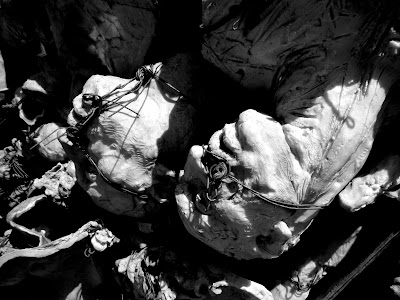'Imprisoned in a flat universe bounded on all sides by the spectacles screen, the consciousness of the spectator has only figmentary interlocutors which subject it to one-way discourse on their commodities and the politics of those commodities. The sole mirror of this consciousness is the spectacle in all its breadth, where what is staged is a false way out of a generalized autism' (Guy Debord, The Society of the Spectacle, thesis 218).
Reading The Society of the Spectacle, I became painfully aware of a sickness of our time. Might it not be that our lives are cognitively flattened, we - if I'm permitted to speak of a 'we' - are becoming alienated from living in four dimensions? More and more, two-dimensional images take over the four-dimensional world we once lived in.
I'm not trying to be dramatic here. Although this a trivial cliche and obvious enough, it is good to realize the invasion of the screens. You are reading this from a two-dimensional screen. Facebook (and the Dutch Hyves) bind our social lives on the screen. Our 'page' is a two-dimensional surrogate for our personalities in cyberspace; these pages started out as a mere representation of popularity, but soon started to embody popularity as such. We all have a camera now, and communicate our lives through two-dimensional images that we upload on our page. At all times, we have the technology to flatten our experiences into pictures. As we all have a camera, more and more, we start to think in images, of the way this festival looks when we have uploaded it. We know recognize ourselves best as en-face or en-profil. Many partake of the en masse snapshot tourism, where tourists hardly take the time to wander through the three-dimensional structure of the old Gothic church and content themselves with a two-dimensional print of the surfaces, the facades. The alien worlds outside our owns only interests us in two-dimensions, and not their rhythms in time or horizons. We sit in our cars, trains and plains and see the world pass by on the window screen as we sit still in our comfortable chairs. We come home to watch the wars of the world in the flat images that have almost lost the power to shock us, or we watch the two-dimensional lives of the stars. And, talking for myself mainly, even the person I'm in love with is more often than not reduced to a flat image that talks to me on skype. Is it really so dramatic to speak of an en-screening, a flattening of our experiences to surfaces?
These are all obvious cultural phenomena, which become explosive only when one realizes that it is the hands-on experience that makes the images come to live. Only our 'own' holiday pictures are magical. But, as images and two-dimensionality take over our lives, they also kill the source of their livelihood; we are maybe not noticing because we might live in a transitional phase. It is a general rule of the brain, - even of biology as such - that if you do not use a function, you deprivate it or even lose it. It is known that if someone is raised in a small space only, this person is unable to cognitively process depth. But the more our lives become en-screened, the more the images themselves become dead, cold, flat.
So many easy but pertinent questions explode in our face. Aren't we becoming alienated from living in four dimensions? Aren't we slowly forgetting to move into the images? Don't we slowly lose the ability to see depth? Don't we lose the ability to feel the passage of time? Is it a coincidence that people become more passive, only able to stare at things instead of staring into them? Is it a coincidence that there is little passion in our age, so little wrongs or ideals that can move us to change in their concreteness? Aren't we letting the four-dimensional world die, in favor of a two-dimensional spectacle? Is not this the core of what we call superficiality? And - to speak with Debord - might it really be Capitalism that has a benefit in flattening our lives because images can be communicated, sold and exchanged (i.e. easily commodified); and might the screens have a function in passifying the lower classes by shooting masses of electrons at them from widescreen tv's so that they will only sit in their couches instead of changing things?
I am the last to advocate some Romantic nostalgia for the real times without screens, rather, why are the screens still flat? Why do the images remain two-dimensional and why aren't we immersed in three-dimensional images yet? Technology is not too fast, it is too slow.


















